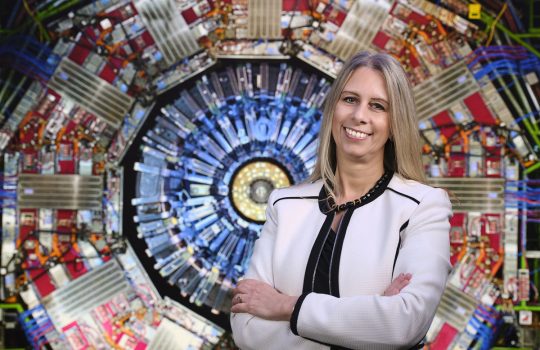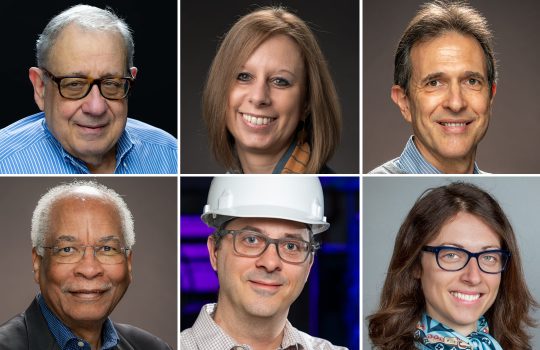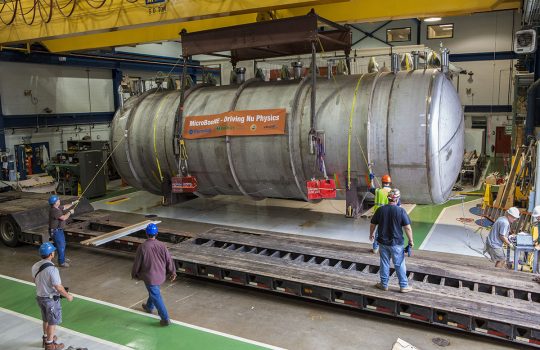Editor’s note: The following press release was issued on Dec. 8, 2023 by the American Physical Society announcing the 2023 Particle Physics Project Prioritization Panel report.
From Fermilab Director, Lia Merminga:
“Fermilab strongly and enthusiastically supports the P5 report in its entirety. The 2023 P5 report provides an ambitious, bold and balanced vision and roadmap for U.S. high-energy physics. It strongly endorses the ongoing physics program, and prioritizes the timely completion and scientific operations of ongoing construction projects; reaffirms the science of DUNE and recommends early implementation of the definitive long-baseline neutrino oscillation experiment; encourages us to collaborate with our international partners towards an offshore Higgs factory; and supports the HEP community’s aspirations to host a muon collider at Fermilab.
“Thank you to the High Energy Physics Advisory Panel and the Particle Physics Project Prioritization Panel members for all of their hard work and time in creating this document that will guide us for the next decade and ensure continued U.S. leadership in particle physics.”
The High Energy Physics Advisory Panel (HEPAP) to the High Energy Physics program of the Office of Science of the U.S. Department of Energy and the National Science Foundation’s Division of Physics has released a new Particle Physics Project Prioritization Panel (P5) report, which outlines particle physicists’ recommendations for research priorities in a field whose projects — such as building new accelerator facilities — can take years or decades, contributions from thousands of scientists, and billions of dollars.
The 2023 P5 report represents the major activity in the field of particle physics that delivers recommendations to U.S. funding agencies. This year’s report builds on the output of the 2021 Snowmass planning exercise — a process organized by the American Physical Society (APS)’s Division of Particles and Fields that convened particle physicists and cosmologists from around the world to outline research priorities. This membership division constitutes the only independent body in the United States that represents particle physics as a whole.
“The P5 report will lay the foundation for a very bright future in the field,” said R. Sekhar Chivukula, 2023 chair of the APS Division of Particles and Fields and a Distinguished Professor of Physics at the University of California, San Diego. “There are extraordinarily important scientific questions remaining in particle physics, which the U.S. particle physics community has both the capability and opportunity to help address, within our own facilities and as a member of the global high energy physics community.”
The report includes a range of budget-conscious recommendations for federal investments in research programs, the U.S. technical workforce, and the technology and infrastructure needed to realize the next generation of transformative discoveries related to fundamental physics and the origin of the universe. For example, the report recommends continued support for the Deep Underground Neutrino Experiment (DUNE), based out of Fermilab in Illinois, for CMB-S4, a network of ground-based telescopes designed to observe the cosmic microwave background, and for the planned expansion of the South Pole’s neutrino observatory, an international collaboration known as IceCube-Gen2, in a facility operated by the University of Wisconsin–Madison.
“In the P5 exercise, it’s really important that we take this broad look at where the field of particle physics is headed, to deliver a report that amounts to a strategic plan for the U.S. community with a 10-year budgetary timeline and a 20-year context. The panel thought about where the next big discoveries might lie and how we could maximize impact within budget, to support future discoveries and the next generation of researchers and technical workers who will be needed to achieve them,” said Karsten Heeger, P5 panel deputy chair and Eugene Higgins Professor and chair of physics at Yale University.
New knowledge, and new technologies, set the stage for the most recent Snowmass and P5 convenings. “The Higgs boson had just been discovered before the previous P5 process, and now our continued study of the particle has greatly informed what we think may lie beyond the standard model of particle physics,” said Hitoshi Murayama, P5 panel chair and the MacAdams Professor of physics at the University of California, Berkeley. “Our thinking about what dark matter might be has also changed, forcing the community to look elsewhere — to the cosmos. And in 2015, the discovery of gravitational waves was reported. Accelerator technology is changing too, which has shifted the discussion to the technology R&D needed to build the next-generation particle collider.”
The United States participates in several major international scientific collaborations in high energy physics and cosmology, including the European Council for Nuclear Research (CERN), which operates the Large Hadron Collider, where the Higgs boson was discovered in 2012. The P5 report recommends that the United States support a significant in-kind contribution to a new international facility, the ‘Higgs factory,’ to further our understanding of the Higgs boson. It also recommends that the United States study the possibility of hosting the next most-advanced particle collider facility, to reinforce the country’s leading role in international high energy physics for decades to come.
# # #
The American Physical Society is a nonprofit membership organization working to advance and diffuse the knowledge of physics through its outstanding research journals, scientific meetings, and education, outreach, advocacy, and international activities. APS represents more than 50,000 members, including physicists in academia, national laboratories, and industry in the United States and throughout the world.
Media only: Anna Torres
APS Head of Strategic Communications
torres@aps.org | 301.209.3605
Media website: www.aps.org/newsroom/



